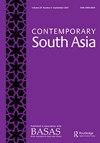After cyclone Aila: politics of climate change in Sundarbans
IF 0.8
3区 社会学
Q3 AREA STUDIES
引用次数: 1
Abstract
ABSTRACT This article compares the politics of climate change in the Sundarbans region in Bangladesh and India based on ethnographic fieldwork in four villages and among migrants from these villages in Kolkata and Khulna city by focusing on the long aftermath of cyclone Aila. The comparison highlights different policy options and framings of extreme weather events . Ten years after the cyclone, the aftermath of Aila continues in both regions we studied in Bangladesh and India, but partly for different reasons. In our study areas in Bangladesh, the aftermath of Aila reinforced the neglect of coastal livelihoods, whereas, in the communities we studied in India, Aila spurred new investments in the affected areas. By comparing how the political is interwoven with the natural, we demonstrate how Aila's lingering impacts have emerged as part of local power relationships and diverse forms of agency. We highlight the multiplicity of policy responses and people's practices not only between communities and countries facing a similar predicament but also within the communities themselves. We argue that the politics of climate change is not only about climate change policy to mitigate the impact of ecological disasters but also about the reconstruction of political agents and practices.飓风艾拉之后:孙德尔本斯的气候变化政治
本文通过对孟加拉国孙德尔本斯地区四个村庄的民族志田野调查,以及对来自加尔各答和库尔纳市这些村庄的移民的调查,比较了孟加拉国和印度孙德尔本斯地区气候变化的政治影响,重点关注飓风“艾拉”的长期后果。这种比较突出了不同的政策选择和极端天气事件的框架。飓风过去十年后,艾拉的余波在我们研究的孟加拉国和印度两个地区仍在继续,但部分原因不同。在我们在孟加拉国的研究地区,艾拉的后果加剧了对沿海生计的忽视,而在我们在印度研究的社区,艾拉刺激了对受影响地区的新投资。通过比较政治如何与自然交织在一起,我们展示了艾拉的挥之不去的影响是如何作为地方权力关系和各种形式的代理的一部分出现的。我们强调,不仅在面临类似困境的社区和国家之间,而且在社区本身内部,政策反应和人们实践的多样性。我们认为,气候变化的政治不仅是关于减轻生态灾害影响的气候变化政策,而且是关于政治代理人和实践的重建。
本文章由计算机程序翻译,如有差异,请以英文原文为准。
求助全文
约1分钟内获得全文
求助全文
来源期刊

Contemporary South Asia
AREA STUDIES-
CiteScore
2.10
自引率
0.00%
发文量
82
期刊介绍:
The countries of South Asia - Bangladesh, Bhutan, India, Maldives, Nepal, Pakistan and Sri Lanka - are internally diverse and part of global flows of people, goods and ideas. Contemporary South Asia seeks to address the issues of the region by presenting research and analysis which is both cross-regional and multi-disciplinary. The journal encourages the development of new perspectives on the study of South Asia from across the arts and social sciences disciplines. We also welcome contributions to pan-regional and inter-disciplinary analysis. Our aim is to create a vibrant research space to explore the multidimensional issues of concern to scholars working on South Asia and South Asian diasporas in the postcolonial era.
 求助内容:
求助内容: 应助结果提醒方式:
应助结果提醒方式:


